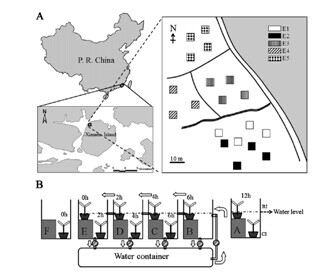Weizhi Lu, Luzhen Chen, Wenqing Wang, Nora
Fung-Yee Tam, Guanghui Lin.Acta Oecologica,2013.49: 83-91.
Mangroves will either face longer tidal
inundation or retreat landwards in response to on-going acceleratedsea level
rise. However, little is known about the growth, regeneration or colonization
ofmangrove seedlings under the different tidal inundation regimes associated
with accelerated sea levelrise. In the present study, a field survey and a
greenhouse mesocosm experiment were conducted toevaluate possible effects of
accelerated sea level rise on colonization, establishment and seedling growthof
a mangrove pioneer species, Avicennia marina. Avicennia populations at
different elevations of theintertidal zone on Xiamen Island in Fujian Province,
China showed distinctive patterns in both seedlingdensity and plant age. The
seedlings at lower elevations had less annual biomass accumulation
andpopulation productivity, but higher shoot to root ratios, suggesting that
elevation has positive effects onseedling growth. The greenhouse mesocosm experiment
with 1-year-old A. marina seedlings utilized fiveinundation periods (0, 2, 4, 6
and 12 h in a semidiurnal tidal cycle) and two inundation depths (rootimmersion
and canopy immersion). Both inundation period and depth exerted significant and
negativeeffects on biomass accumulation, photosynthetic rate, leaf electron
transportation and water use efficiency.However, the negative effects of canopy
immersion were more profound than root immersion.Canopy immersion exacerbated
the effects of prolonged inundation, with no seedlings surviving undercanopy
immersion at the 12-hour treatment. These results suggest that at lower
elevations with highersea level, canopy immersion will have greater negative
effects on seedling colonization, establishmentand early growth of A. marina.
This finding is instrumental in predicting the future dynamics of
mangroveforests under increasing sea levels.

返回

